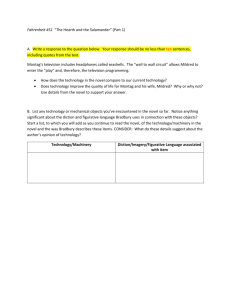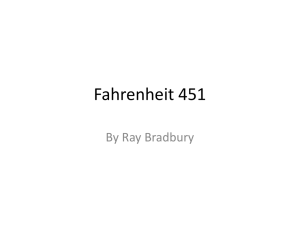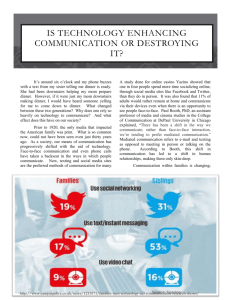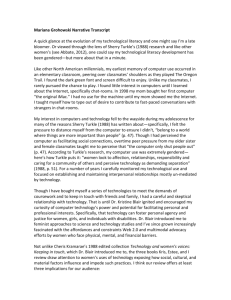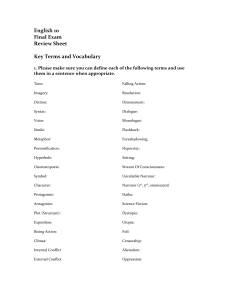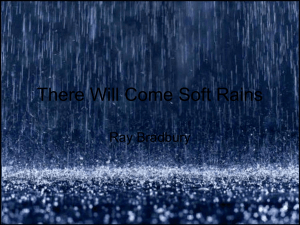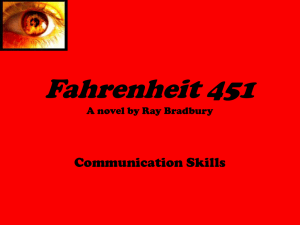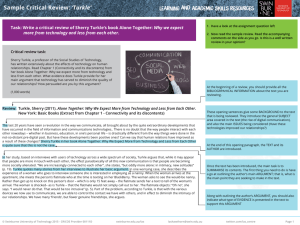9th Grade Honors Name: 451 Prereading questionnaire Prior to
advertisement
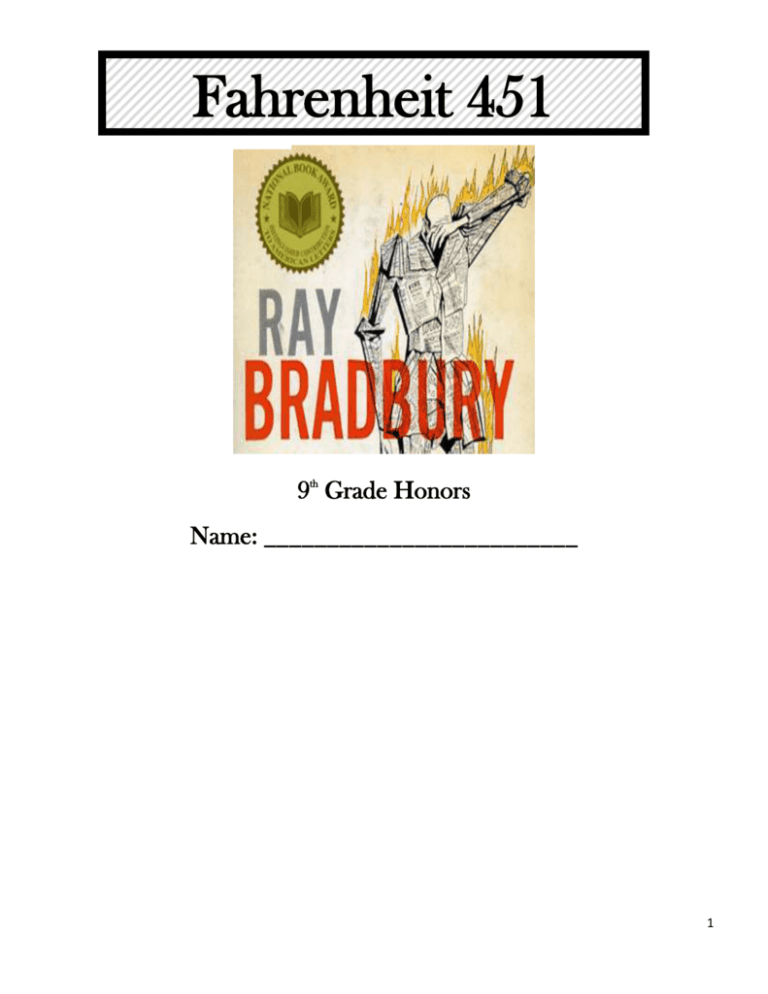
Fahrenheit 451 9th Grade Honors Name: _________________________ 1 451 Prereading questionnaire Prior to reading Fahrenheit 451, we will be discussing one of the themes of the novel. In spite of the novel being about a future society where books are illegal, the author, Ray Bradbury, insists it is NOT about censorship. Instead, his purpose was to explore the effects of technology on how we communicate with others. The novel was written decades ago, yet Bradbury was exploring ideas that we are dealing with today. This questionnaire is a way to start thinking about these ideas. 1 = Very often 2 = Often 3 = Not very often 4= Never _____1. I text others while I am in the physical presence of my friends. _____2. I text while having dinner with my family. _____3. My parents use their phones at dinner time. _____4. I check my phone during academic classes. _____5. I sleep with my phone next to my bed. _____6. I sleep with my phone in my hand. _____7. I stress a bit about the pictures and posts I make because I worry about what others will think. ____8. I communicate with my parents by text. ____9. I feel pressure to answer my parents’ calls and texts. ____10. I would prefer to communicate bad news (can’t meet a friend on the weekend etc) by text instead of calling or telling them in person. 2 Jot down how many times a day you check/use your phone. Use tally marks to record when you check your phone during a 24 hour period. Meal time Work time (school, homework) Practice time (music, sports) Friend time (time when you are physically with friends, not during classes) Transition time (on bus, in car, waiting somewhere) Sleep Time 3 Has the oversaturation of technology impacted how we communicate with one another? As you read, talk to the text writing out questions, opinions, predictions, connections or other reactions you may have in the margins. Heard on Fresh Air from WHYY October 18, 2012 - TERRY GROSS, HOST: This is FRESH AIR. I'm Terry Gross. As much as most of us are annoyed when a conversation we're having is interrupted while the person we're speaking with reads a text or checks email, let's be honest: Most of us have done the same thing to someone else. Our digital devices are changing how we communicate and who we communicate with. My guest, Sherry Turkle, has been researching computer culture for 30 years. Her latest book, "Alone Together: Why We Expect More from Technology and Less from Each Other," has just come out in paperback. It's about developments in digital culture over the past 15 years with a focus on the young, those from five through their early 20s who are digital natives, having grown up with cell phones and digital toys. Turkle is the founder of MIT's initiative on technology and self and is a clinical psychologist. Her latest book forms a trilogy with her earlier books, "The Second Self" and "Life on the Screen." Sherry Turkle, welcome to FRESH AIR. One of the things you write about in "Alone Together" is how children have grown up in a culture of distraction. SHERRY TURKLE: Yes. GROSS: I assumed there that you would be talking about how children and teens are so distracted by texting their friends all the time, but you're talking about children's parents, too... TURKLE: Yes. GROSS: ...that children's parents are distracted. I want you to describe some of the complaints that children have expressed to you about their parents being distracted by their personal devices. TURKLE: Yeah, well, what my fieldwork has shown is that, from the minute these children met this technology, it was the competition. I do my fieldwork in playgrounds, and parents are texting and on cell phones as their kids play on the jungle gyms and swings, and parents text during breakfast and dinner as their children beg them for attention. Parents text at games when the kids are on the playing field, often missing the big score. Parents are on the phone in cars, and the kids are left to text in the backseat on their devices instead of having those precious moments, you know, to find out what - to eavesdrop on your kids or talk to your kids in the car on the way to school. So children grow up learning that they're not the center of their parents' attention. One of the most poignant interviews I did was with a young man who talked about how his father used to watch the Sunday games with him and maybe have the Sunday newspaper between them and share the sports section or the news section. 4 And now his father does his email and texts. And it's just not the same. He misses his dad. GROSS: So let's turn the tables. What are some of the complaints that parents shared with you about their children being distracted by their cell phones and other devices? TURKLE: Well, parents then suffer the slings and arrows of not having their children's attention, and I think that what's the big change I see now is that parents are starting to accept, really over the past two years, a little bit of the responsibility for that. It's hard to get your child's attention because your child doesn't want, for example, to answer your calls. Your child will only respond to a text message. This is a very common complaint of parents. Children during dinner will want to text. It's very hard to get them to come to dinner and eat, and so what I suggest to parents is that they use dinners as really sacred spaces where they say look, dinner is a time when we come together as a family, and if I haven't followed these rules since you were young, I'm sorry. I've made mistakes, too, but now we're starting to put a basket, you know, in the kitchen and in the dining room, and we all put our phones in that basket, and we... GROSS: Are they turned off? (LAUGHTER) TURKLE: And the phones are turned off just as a lot of professors are starting to say, you know, look, we've taken things too far, and we put a basket in the classroom, and this seminar really is for us having a conversation together. Because we know that our... GROSS: Do you do that? TURKLE: I'm starting to, because I taught a course last semester, and halfway through the course - it was a course on memoir, a course in which the students in the course were sharing very really intimate details of their life. It's a course where students talk about their lives. We read memoirs, and then the students write memoirs, and members of the class admitted that they were texting, kind of, under the desks. And we talked about it in class, and it was not OK that there was texting during class, and we just decided that... GROSS: And your objection to that was that people were sharing intimate moments, and other people weren't paying attention? Or were you afraid somebody was, like, live tweeting somebody's personal confessions? TURKLE: No, the objection of the class was that this was really a conversation and that we were losing that we were losing the sense of this class as a conversation, and that that is the value of what we're there to do together is to have a conversation together and that that is what we should be about. And what the students taught - we had a great conversation about what was so seductive about texting, and essentially I heard from the students what I hear from so many adults. I think we've over-hyped the difference between students - between young people and older people on this issue. And they all say to me that what's so seductive about texting, about keeping that phone on, about that little red light on the BlackBerry, is you want to know who wants you. 5 GROSS: You had said before a lot of parents complain that their children will accept the parents' text message and respond to that, but they won't pick up the phone, they won't answer the cell phone. TURKLE: Yes. GROSS: I'm sure you've spoken to children and teenagers about that. What's the explanation? TURKLE: Well, I'm working now on sort of this flight from conversation project because really what I'm hearing is people saying to me, I mean this kind of phone-phobia, and also conversation-phobia. And people basically say - I mean, one 18-year-old says to me: someday soon, but certainly not now - I mean as though I was going to do something to him - certainly not now, I'd like to learn how to have a conversation. And when I say to people, what's wrong with conversation, they say, I'll tell you what's wrong with conversation: You can't control what you're going to say, and you don't know how long it's going to take or where it could go. And that's exactly what's wrong with conversation, but that's exactly what's right with conversation. And this is the kind of thing that people feel they don't have time for in the incredibly busy lives and stressed lives that they have, and it's what people are getting used to not wanting to make space for, emotionally. GROSS: Now you're talking about adults and children? TURKLE: I'm talking about adults and children, and children - I mean, I'm thinking of, now, a college sophomore who talks to me about wanting to text a friend. And I say, well, you know, he lives in the dorm next door. Why not go to see him? And this young man actually - basically says, well, I really don't see why a Gchat won't do the job. I mean, there's almost a falling away of what you would lose by not having the face-to-face. So my concerns are sort of double. It's both that we are not making the time because we feel we don't have the time, and it's also losing the skills that we get from talking to each other face-to-face, which are skills of negotiation, of reading each other's emotion, of having to face the complexity of confrontation, of dealing with complex emotion, of dealing with confrontation. You know, it's the difference between apologizing and typing "I'm sorry" and hitting send. So I think we're substituting connection for conversation. And developmentally, adolescents would kind of rather do that, but developmentally they're also missing out when they do that. So we're shortchanging ourselves, and I fear that we're forgetting the difference. GROSS: You write about how parents, nowadays, give their children a cell phone somewhere around the age of nine or by 13, and the parents tell them this is going to help keep you safe because if you get in trouble, if anything goes wrong, you are a phone call away from your parent. What are the pros and cons, as far as you're concerned, of what you describe as the tethered child, the child who always has that connection? TURKLE: You know, first of all children, when I wrote the book, even in the brief time since I penned the book, the ages have kind of gone down to eight, to seven, to six. Children are getting these phones earlier and earlier. These are years when children need to develop this capacity for solitude, this capacity to feel complete playing alone because, you know, if you don't have a capacity for solitude, you will always be lonely. 6 And my concern is that the tethered child never really feels that sense of - that they are sort of OK unto themselves. And I talk to college students who've grown up, you know, with the habit of being in touch with their parents, you know, five, 10, 15 times a day. And, you know, it's no longer Huckleberry Finn as a model of adolescence, kind of, you know, sailing down the Mississippi alone. We've developed a model of adolescence and childhood where, you know, we sail down the Mississippi together with, you know, with our families in tow. And... GROSS: But that's very reassuring to parents, isn't it, I mean getting all those texts? TURKLE: Parental reassurance is not the goal. The goal is a child who has a healthy separation and a sense of healthy, separated identity, and we have to balance parental reassurance with a child who feels competent, independent and able to be alone. GROSS: So when you say that a lot of children text their parents five, 10, 15 times a day... TURKLE: Yes. GROSS: Is that in part pressure from parents, like I want you to keep in touch with me, tell me where you are? Or do you think it's more generated from the children wanting to always tell their parents what they're doing? TURKLE: I think it's both. The parents are pushing for it. The children are compliant. And constantly sharing where you are, what you're doing starts to be kind of a way of life. And when the children start to pull back, the parents get very upset, and many children just feel oh my God, you know, it's just so easy to hit, you know, to just kind of text something that, you know, I'm just not going to make a big deal of it. But in a way, that keeps kids in a kind of soup of connection that is really changing what we mean by the separation of adolescence, which I still think is a very important part of what adolescence should be about. GROSS: Some of the teenagers you were interviewing said to you that shouldn't they have a privacy zone, a right to a time when they don't have to take their parents' phone call, or a right to just, like, not respond, just like be on their own and not respond. Would you describe the kind of concerns teenagers were expressing to you about that? TURKLE: Yes, I mean, they basically felt that the technology was getting in their way of having what they some of them would call it sort of, teenagers had in yesteryear. They looked at their older brother sisters, and they had two concerns, that first of all their older brothers and sisters were allowed to not be in touch with parents in a way that they felt was not available to them, but also, and this was very moving, they felt that on Facebook their life story followed them through their lives in a way that their older brothers and sisters were allowed to start fresh when they moved from elementary school to junior high, from junior high to high school, and then crucially from high school to college. And one said to me: My God, it used to be that when you went away to college, you got a chance to start fresh, to be a new person. And that used to - I bet that was great. And I think that this sense of the Facebook identity sort of as your - something that follows you all your life is something that many adolescents feel is a burden. 7 And I think that there's another thing about the Facebook identity in adolescence, which is that many adolescents used to play with identity, play with multiple identities in adolescence, and that used to kind of be their fun. And now there's one identity that counts, it's the Facebook identity. And I think many adolescents are also feeling the pressure of that. So there are many things about the new technology that's changing the nature of adolescence, and I think that the complaints of adolescents about the new technology are - it's a long list even as they're, you know, even as they're working with it. (BREAK) GROSS: Getting back to the idea of privacy from your own parents, did a lot of teenagers express to you the sense that they're always on call? TURKLE: Yes, teenagers do feel on call from their parents. They are on call from their parents, and there are struggles within families of how much they should be on call because parents get used to texting and then worrying if a child doesn't respond because we're all used to texting and then basically feeling that, you know, whereas if someone didn't respond to a telephone call within five minutes, well, that was natural, I mean a voicemail or telephone call, that was something that, you know, you maybe had 24 hours, 10 hours to get back to. But a text message, you know that that person has gotten it, and adolescents feel the kind of pressure of parental concern if they don't get right back to them. And I think that's - you know, that's something that adolescents complain about. They don't want to feel on call in that way, and yet parents start to worry. GROSS: How long have you been concerned about this? How recent do you think the phenomenon is that young people are growing up uncomfortable - often uncomfortable with conversation and preferring texting because it's safer? TURKLE: I began to see this, I would say, about five years ago. I began - I think this began with the - with texting as a - with Facebook and texting, with the advent of a powerful new technology that really allowed you to put up a profile, curate a self, put up an ideal self that was the self you wanted to be, not necessarily the self you were, and then hide behind the self and the texts and really live a life in which, you know, you could hide behind the Net in really a new kind of way. GROSS: So you're describing a certain insecurity or anxiety there that if you show your real self or your physical self in some relationships, that might be uncomfortable. TURKLE: Yes, and I also began to see something new that I call "I share, therefore I am." You know, it used to be that people had a way of dealing with the world that was basically, I have a feeling; I want to make a call. And now I would capture a way of dealing with the world which is, I want to have a feeling; I need to send a text. That is that with this immediate ability to connect and almost pressure to do so because you're holding your phone, you're constantly with your phone, it's almost like you don't know your thoughts and feelings until you connect. And that again is something that I really didn't see until texting. You know, kids are sending out texts all the time. First it was, you know, every few minutes. Now it's many times a minute, people walking along the street continually texting. 8 Thoughts on the “face” of Facebook TURKLE: I've looked into this a great deal, and it's not just kids. And it all stems from the same thing which is that when we are face to face - and this is what I think is so ironic about Facebook being called Facebook, because we are not face to face on Facebook, we are not face to face on the Internet. You know, when we are face to face, we are inhibited by the presence of the other. We are inhibited from aggression by the presence of another face, another person. We're aware that we're with a human being. On the Internet we are disinhibited from taking into full account that we are in the presence of another human being. GROSS: You know what this reminds me of just in my own life... TURKLE: Yeah. GROSS: ...you know, as an adult and a professional? I've had people walk out on me during interviews. It's always been a long-distance interview, when I'm in the studio in Philadelphia and they're in... TURKLE: Yeah. GROSS: ...New York or California or, you know... TURKLE: Yeah. GROSS: ...LA, you know, Chicago, whatever. I've never had somebody be really rude to me or walk out on me when we were sitting face to face. TURKLE: Absolutely. I just recently interviewed someone who gave me the most concrete and mundane example of this, which didn't involve bullying. He was talking about as a child wanting to get out of dinner. So this wasn't bullying. So I think it makes a better example - wanting to get out of dinner with his grandmother. And his mother used to say: Call her. And so he had to call her and he had to hear her voice saying, But honey, your grandfather and I have just set the table, the chicken is in the oven, the asparagus are all ready, we're waiting for you, we want to hear about the class you're taking, we're so sorry, we miss you. He could hear even on the phone - not face to face - the voice, the disappointment. He was over there in a flash. As opposed to sitting down, typing or texting - I'm not coming over - and hitting send. It's all the difference in the world and that's only the voice. Can you imagine having to go over to your grandmother's house and saying, I'm not coming over for dinner, I'm too busy? GROSS: Do you have any advice for the parents of children or for, you know, young people about how to deal with online bullying? I know advice isn't your thing, but I thought I'd ask. TURKLE: No, advice - no, advice very much is - advice very much is my thing. GROSS: OK. TURKLE: First of all, if you know who it is, you ask for a face to face meeting. The most important... GROSS: You, the person being bullied or you, the parent of the person being bullied? 9 TURKLE: Well, it's best if you deal through a teacher or a parent. It's always best if an adult, I mean certainly if you can deal with an adult or a counselor of some sort to set it up and act as a mediator. But in every case where something is happening on the Internet that's disturbing, you know, when you're a child or when you're a grown-up, the way to handle it is to bring this to the face to face. Because nine times out of 10, having a conversation and triggering all of the, you know, the complexity and the power and the virtues of our human responses to each other when in fact we allow the complexity of these human responses to kind of kick in really helps the situation. GROSS: If you're just joining us, my guest is Sherry Turkle. Her book "Alone Together: Why We Expect More from Technology and Less from Each Other," is now out in paperback. Let's take a short break here and then we'll talk more about how our personal devices are affecting our relationships with other people and with our sense of identity. This is FRESH AIR. (SOUNDBITE OF MUSIC) GROSS: If you're just joining us, my guest is Sherry Turkle. We're talking about how our relationships with our personal devices are affecting our relationships with other people, as well as our sense of identity. She's the author of the book "Alone Together: Why We Expect More from Technology and Less from Each Other," and this is basically her third book about how the Internet is affecting our lives. She's a professor at MIT, where she directs the Initiative on Technology and Self. You've been studying how the Internet is affecting our relationships and sense of identity for a long time. So you've seen basically like a generation or two grow up with this. So you've talked to people who use, you know, all of the personal devices now but didn't grow up with them, and you've talked to a lot of people who grew up with them and don't know any other world but the world of personal devices, of texting and cell phones and email and all these other applications. So what would you say are some of the major generational differences you've seen in how people respond to their devices and to other people? TURKLE: Well, the most surprising thing for me is the similarities rather than the differences. Of course there are differences. You know, sleeping with your cell phone is something that young people do. Very few young people don't sleep with their cell phones. They don't even pretend that it's an alarm clock. I mean... (LAUGHTER) TURKLE: Older people sleep with their cell phones and they, you know, will pretend. In an interview I always ask, do you sleep with your cell phones? And older people say yes, I use it as an alarm clock. Young people just admit that they sleep with their cell phones and they check their email, they check their text many times during the night. Older people will go through the - well, at least tell you that they use it as an alarm clock. That's one kind of difference in how the interview unfolds. But one of the things that I've got to say really has surprised me is how the hype about generational difference I think is greater than the difference themselves. I think we have become - that the pull of these devices is so strong that we've become used to them faster than anyone would have suspected. I came to this interview without my phone and when I got to the studio, I realized I'd left it behind and I felt a moment of, oh my god, I left my cell phone behind, and I felt it kind of in the pit of my stomach. And I had to stop myself and think, I'm here. I really don't have anyone I need to call. 10 Reaction Journal: What are your thoughts about this article? Do you agree or disagree with any of the comments made by Gross or Turkle? Use specific examples from the text. 11 Socratic Seminar Write out at least 10 questions about the Fresh Air interview with Sherry Turkle. 1. 2. 3. 4. 5. 6. 7. 8. 9. 10. Interesting Notes from Discussion 12 Vital Passage Assignment (VPA) In a novel, certain passages are more important, or vital, than others due to their vital influence on such things as plot, character development and themes. You will be selecting vital passages from Fahrenheit 451 and writing about why these passages are so important. We will be completing many Vital Passage Assignments during our reading of the novel. ************************************************************************ SELECT TWO OF THE FOLLOWING TO WRITE ABOUT IN YOUR VPA 1. Theme Development You can relate your passage to the theme of :Saturation of Technology 2. Plot Development: Meaning that the passage is important to the development of the plot because: it is an important event in the life of a character or it causes something else to happen in the novel or it is the inciting incident or climax of the novel. 3. Character Development: Meaning that the passage is important to the development of particular characters. It could an event which caused the character to see things in a new way. This event might have made a big impact on the character for some reason. It might be an example of figurative language (simile/metaphor) which helps to develop a character. 4. Figurative Language: What similes, metaphors or imagery does Bradbury use in your passage and to what effect? Does it develop characters? Setting? Conflicts? Themes? ************************************************************************ Requirements: Begin each entry with a heading (be sure to double space everything) Then copy the quote which you will be writing about. Your selection should be between 1 and 20 lines. Then begin your analysis of the chosen passage, explaining how it is an example of a theme, and EITHER plot development or character development. 13 Student Name Teacher Name English I – Period 1 Date VPA # 1 – The Hearth and the Salamander “The autumn leaves blew over the moonlit pavement in such a way as to make the girl who was moving there seem fixed to a sliding walk, letting the motion of the wind and the leaves carry her forward. Her head was half bent to watch her shoes stir the circling leaves. Her face was slender and milk-white, and in it was a kind of gentle hunger that touched over everything with tireless curiosity” (Bradbury 5). This passage describes, for the first time, the appearance of Clarisse.(first sentence tells the reader what the passage describes) Bradbury uses eerie imagery to describe Clarisse and this helps to develop her as a almost supernatural character who differs from everyone else in the novel. (thesis: this sentence tells the reader what devise is being used (imagery) and what is it doing (developing character). It is also very specific) Clarisse does not simply walk down the street, the leaves on the pavement are moving around her and it makes it appear as though she is floating, supernaturally, down the street. Her “slender and milk-white” face is equally eerie. She resembles a ghost in her pale appearance and this further develops her as a character whom differs greatly from everyone else. Her face is also described as having a gentle hunger. Clarisse is a character who does hunger for real human contact and real world experiences with nature. This desire can be seen in Bradbury’s use of “hunger” to describe her face. 14 Vital Passage Assignment Guide to Selecting & Analyzing your Passage Be sure your passage is not longer than about 20 lines. 1. Is your passage important to character development? The following questions might help you to determine this. Is it a significant moment in the life of a character? How? Does help describe a character’s physical characteristics? Does the character have a realization in your passage? Have the character made an important change? Did the character say something that was really important to our understanding of him/her? Does Bradbury use figurative language to describe him/her? 2. Is your passage important to the development of the plot? The following questions might help you to determine this. Does the plot make a drastic or important shift? Is this an important moment in the novel because something is revealed? How would the novel be different/impacted without the passage? Is this moment an event in the plot structure? Exposition: establishes setting, introduces characters Inciting Incident: ONE event that starts the main conflict Rising Action: events that lead to climax Climax: ONE event that is the turning point of the story Falling Action: Events leading to the resolution Resolution: ONE event that ends the main conflict 3. Is your passage important to the development of the themes of the novel? Is the passage an example of any of the themes? HOW does the passage represent the novel’s themes? What do you think the passage’s message about the theme is? You only need to connect your passage to TWO of the above literary devices. 15 PART 1: THE HEARTH AND THE SALAMANDER 1. 2. 3. Provide adjectives and text support to describe each of the “characters” (2 per character minimum) Provide 5 quotes (as you read) that you found especially interesting. Answer the after reading questions for Part 1. “CHARACTER” ADJECTIVES PROOF FROM TEXT (where to find on page number) 1. Guy Montag (note: already shows he is a dynamic character in this section) 2. 1. Mildred Montag 2. 1. Clarisse McClellan 2. 1. Captain Beatty 2. 1. The Mechanical Hound 2. 1. Books 2. 16 QUOTE NOTE THOUGHT (lines you find interesting from text + location and page number) (what this line literally mean within the text) (your thoughts about the line and why you find it interesting 17 AFTER READING PART 1: THE HEARTH AND THE SALAMANDER 1. This novel is set in the future (don’t forget it was written in 1953). However, the world of Guy Montag is much like our own. How? Consider at least 5 things as well as 5 personality traits. 2. What is meant by a dystopian work of fiction? 3. What is the significance of Fahrenheit 451? Provide insight into the heart and the salamander. What do these mean to the overall text? Consider how fire changes and destroys. 4. What specifically bothers Guy about Clarisse (at first)? Although it was already brewing, what eventually bothers Guy about Mildred? Why do they not even know where they met? 5. Montag is desperate to remember a time when unnecessary and damaging technology saturation was not the purpose of life. In doing so, he allows Clarisse’s quirkiness to resonate and he takes the books home. How does Mildred react? Why? Is this the end of Montag? 6. Is the hound programmed to get Montag? Evidence to support your claim? 7. Unsurprisingly, we have more people today glued to electronics than ever before. We also have more issues with mental health, a higher obesity rate, and higher heart disease statistics; yet similar to the characters—Mildred—in Fahrenheit 451, we choose this life. Why do we choose it? Why do we succumb to the advertisers’ manipulation of our perceived wants and needs? 18 PART 2: THE SIEVE AND THE SAND Provide 5 quotes of interest as you read Part 2 of Fahrenheit 451. Then, answer the after reading questions. QUOTE NOTE THOUGHT (lines you find interesting from text + location and page number) (what this line literally mean within the text) (your thoughts about the line and why you find it interesting 19 1. Describe Faber and his significance. How are he and Clarisse alike and dissimilar? 2. Faber makes the argument that people are unwilling to accept the things in the world that make them uncomfortable, which is why they consume and blind themselves with meaningless media. Are we the same way? Which is more viewed and discussed: the current-events news or pop/celebrity news? After being insensitive to Mildred’s friends, Montag considers whether he is wrong—perhaps it is better to focus only on pleasure. Do you agree? 3. Describe the sand and the sieves as a symbolic of our search for truth and meaning. 4. At this point in the novel, Montag is developing into a self-aware character. In which ways is he finally starting to get the real point of life? 5. Captain Beatty ironically uses literature to argue against the study and beauty of literature. What are his arguments and how can they be discounted? In which ways, though, do we make his arguments true? Consider newspapers, information that is forgotten in school, etc. 6. Do you find Guy Montag’s pursuit of knowledge instead of ignorance to be admirable or foolish? Explain? 20 7. Read the full poem of “Dover Beach” below. Why is this poem chosen by Bradbury to highlight through his character of Guy Montag? Which lines mostly stand out? Dover Beach By Matthew Arnold The sea is calm tonight. The tide is full, the moon lies fair Upon the straits; on the French coast the light Gleams and is gone; the cliffs of England stand, Glimmering and vast, out in the tranquil bay. Come to the window, sweet is the night-air! Only, from the long line of spray Where the sea meets the moon-blanched land, Listen! you hear the grating roar Of pebbles which the waves draw back, and fling, At their return, up the high strand, Begin, and cease, and then again begin, With tremulous cadence slow, and bring The eternal note of sadness in. Sophocles long ago Heard it on the Ægean, and it brought Into his mind the turbid ebb and flow Of human misery; we Find also in the sound a thought, Hearing it by this distant northern sea. The Sea of Faith Was once, too, at the full, and round earth’s shore Lay like the folds of a bright girdle furled. But now I only hear Its melancholy, long, withdrawing roar, Retreating, to the breath Of the night-wind, down the vast edges drear And naked shingles of the world. Ah, love, let us be true To one another! for the world, which seems To lie before us like a land of dreams, So various, so beautiful, so new, Hath really neither joy, nor love, nor light, Nor certitude, nor peace, nor help for pain; And we are here as on a darkling plain Swept with confused alarms of struggle and flight, Where ignorant armies clash by night. 21 Ray Bradbury Interview While watching an interview with the late Ray Bradbury, answer the questions below and consider how his experiences and thoughts aided in the creation of this novel. 1. What types of materials did Bradbury read as a child? 2. What authors influenced Bradbury? 3. “75 years of writing everyday” – what can you infer about Bradbury from this line? 4. When Bradbury was fifteen-years-old, Hitler burned books in the streets. How did this influence Bradbury? 5. According to Bradbury, why is reading important? 6. When did Bradbury publish Fahrenheit 451? 7. How does Bradbury create his characters? 8. What themes/topics does Bradbury discuss in all of his books? 9. Write down one quote or experience that was interesting to you. Why did this line catch your attention? 22 PART 3: BURNING BRIGHT Provide 5 quotes of interest as you read Part 3 of Fahrenheit 451. Then, answer the after reading questions. QUOTE NOTE THOUGHT (lines you find interesting from text + location and page number) (what this line literally mean within the text) (your thoughts about the line and why you find it interesting 23 1. The climax of our story is in this section. What is it and why? 2. Guy Montag, though our hero, acts quite frantically. In a way, this makes him more realistic? Do you agree or disagree (with support) the he should be ashamed of his actions over the last week, as he states to Faber? 3. It can be argued that Beatty, with his sharp knowledge of literature and argumentative skill and lack of escape at the end, would prefer to be Montag over himself as the Captain. Which do you agree with? Provide textual support to your claim. 4. Once Montag escapes the hound and ensures Faber is safe, he meets the homeless men—the harbingers of knowledge— along the railroad. He is not angry with Mildred, but rather pities her and realizes she would never be able to stand the silence. Are we the same way? Do we not notice the smell of nature, as Montag notices for the first time at the railroad, or the appreciation of quiet? 5. Do you think our news media finds scapegoats to satisfy our need for closure? 6. Compare Granger’s meaning of legacy through his grandfather’s story with that of Macbeth’s meaning of life. Why are the characters’ viewpoints so different? 7. Provide meaning to the following themes and symbols once finished with the novel. THEME MEANING AND PROOF/EVIDENCE FROM TEXT Knowledge v. ignorance Loneliness Apathy Change SYMBOL MEANING AND PROOF/EVIDENCE FROM TEXT Fire Phoenix Mirrors Sand 24 8. Read the below poem by William Blake and apply the message to our final section of Fahrenheit 451. Which lines in particular stand out to being people changers? “The Tiger” by William Blake Tyger Tyger, burning bright, In the forests of the night; What immortal hand or eye, Could frame thy fearful symmetry? In what distant deeps or skies. Burnt the fire of thine eyes? On what wings dare he aspire? What the hand, dare seize the fire? And what shoulder, & what art, Could twist the sinews of thy heart? And when thy heart began to beat, What dread hand? & what dread feet? What the hammer? what the chain, In what furnace was thy brain? What the anvil? what dread grasp, Dare its deadly terrors clasp! When the stars threw down their spears And water'd heaven with their tears: Did he smile his work to see? Did he who made the Lamb make thee? Tyger Tyger burning bright, In the forests of the night: What immortal hand or eye, Dare frame thy fearful symmetry? 25 26 FINAL DISCUSSION POINTS 1. Neil Postman’s book from 1985 entitled Amusing Ourselves to Death argues that our own demise will not come from a tyrannical leader, but rather from the tyranny that we continue to create within our mass media culture. He believes the following. Do you agree or disagree? --That we have come to love and adore our oppression from truth. --We have become a culture of mass entertainment and truth has drowned in a sea of irrelevance. --Entertainment has taken over our culture and we do not know the difference between what is really important vs. what does not really matter. --Is how we live really the good life? --We are passive observers. When we “like” something on Facebook, such as a person advocating against animal abuse, it is the same in our minds as actually doing something about it. 2. Thus Spoke the Spectacle. Do you believe our news media is responsible for controlling our focus? 3. We have more free time than ever. Why are our interpersonal relationships suffering? 4. Do you feel there is anything getting worse over time? Explain with specifics. 5. What really makes you happy? Final videos: wild cat, John Greene. 27

